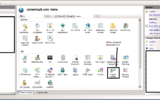Merhaba bildiğiniz üzere sunucuların baş belası haline gelen shell,telnet ve root exploitler ne yazikki bazen şifrelendiği için linux veya windows sistemlerde yakalanmaz durumda oluyor.Size aşağıdaki vereceğim yazılım bu şifreli kodlara sahip spam araçları,exploit ve shelleri bulan bir yazılımdır.
Ayrıca son zamanlarda yaygın bir biçimde tüm hosting firmalarını rahatsız eden CryptoPHP yazılımınada çözüm üretiyor.İlk önce kodları indirebileceğiniz siteyi vereyim;
http://cbl.abuseat.org/findbot.pl
[php]
#!/usr/bin/perl
# The above line may need to be changed to point at your version of Perl
#
# This script attempts to find malicious files/scripts on your machine.
# It specifically looks for spambots that we’re aware of, as well
# as "suspicious" constructs in various scripting languages.
#
# To use it, you should put this in a file on your computer called
# "findbot.pl" and make it executable by "chmod 755 findbot.pl".
#
# By default, findbot.pl scans the directories /tmp, /usr/tmp, /home and
# /var/www. This script isn’t fast. So if you know where to look you can
# speed things up by giving just the directories that you suspect has the
# malware.
#
# You can often find out what user is infected by using:
# lsof -i | grep smtp
# and looking for processes that are NOT your mail server.
#
# If you’re successful finding the user, you need to look everywhere the user
# has write permissions – and you can run findbot.pl faster, by something like:
#
# findbot.pl /tmp /usr/tmp /home/ <user’s web directory>
#
# There are two types of "detections" – "suspicious files" are files that contain
# things that -may- be malicious.
# "malware" is definitely malicious software.
#
# This script needs the following command line utilities. It will not run
# if it can’t find them, you will have to install them yourself:
# – "md5sum" (Linux) or "md5" (FreeBSD etc) this appears to be standard
# core utilities.
# – "strings" – on Linux this is in the "binutils" package
# – "file" – on Linux this is in the "file" package.
#
# Usage:
# findbot.pl [-c] [directories…]
#
# If a list of directories is supplied, it’s used, otherwise,
# /tmp, /usr/tmp, /home and /var/www are use by default.
#
# The -c option is a shortcut to make finding cryptophp faster and
# easier, but this may not work in all situations
#
# Very simple web malware detection module.
# Version 0.02 2013/01/02 Ray
# .01 -> .02:
# – more strings of bad software
# – search for encoded perl scripts
# .02 -> .03: 2013/01/10 Ray
# – speed up
# – MD5 stuff
# .03 -> .04: 2013/01/13 Ray
# – improved docs
# .04 -> .05: 2013/01/20 Ray
# – more patterns
# – MAXLINES way too small
# .05 -> .06: 2014/10/31 Havriliuc Andrei, Hostvision srl, Romania
# – many more patterns/heuristics from hoster’s experience
# – Thanks for the contribution!
# .06 -> 07: 2014/11/22 Ray
# – Speed up specifically for current version of cryptophp</code>
my $access = ‘(\.htaccess)’;
my $accesspat = ‘(RewriteRule)’;
## Extensions scanned
my $scripts = ‘\.(php|pl|cgi|bak|sh|txt|jpeg|jpg|png|gif|bmp|css)$’;
## Patterns
my $scriptpat = ‘(social\.png|r57|c99|web shell|passthru|shell_exec|base64_decode|edoced_46esab|PHPShell|EHLO|MAIL FROM|RCPT TO|fsockopen|\$random_num\.qmail|getmxrr|\$_POST\[\’emaillist\’\]|if\(isset\(\$_POST\[\’action\’\]|BAMZ|shell_style|malsite|cgishell|Defaced|defaced|Defacer|defacer|hackmode|ini_restore|ini_get\("open_basedir"\)|runkit_function|rename_function|override_function|mail.add_x_header|\@ini_get\(\’disable_functions\’\)|open_basedir|openbasedir|\@ini_get\("safe_mode"|JIKO|fpassthru|passthru|hacker|Hacker|gmail.ru|fsockopen\(\$mx|\’mxs\.mail\.ru\’|yandex.ru|UYAP-CASTOL|KEROX|BIANG|FucKFilterCheckUnicodeEncoding|FucKFilterCheckURLEncoding|FucKFilterScanPOST|FucKFilterEngine|fake mailer|Fake mailer|Mass Mailer|MasS Mailer|ALMO5EAM|3QRAB|Own3d|eval\(\@\$_GET|TrYaG|Turbo Force|eval \( gzinflate|eval \(gzinflate|cgi shell|cgitelnet|\$_FILES\[file\]|\@copy\(\$_FILES|root\@|eval\(\(base64_decode|define\(\’SA_ROOT\’|cxjcxj|PCT4BA6ODSE|if\(isset\(\$s22\)|yb dekcah|dekcah|\@md5\(\$_POST|iskorpitx|\$__C|back connect|ccteam.ru|"passthru"|"shell_exec"|CHMOD_SHELL|EXIT_KERNEL_TO_NULL|original exploit|prepare_the_exploit|RUN_ROOTSHELL|ROOTSHELL|\@popen\(\$sendmail|\’HELO localhost\’|TELNET|Telnet|BACK-CONNECT|BACKDOOR|BACK-CONNECT BACKDOOR|AnonGhost|CGI-Telnet|webr00t|Ruby Back Connect|Connect Shell|require \’socket\’|HACKED|\@posix_getgrgid\(\@filegroup|\@posix_getpwuid\(\@fileowner|\&\#222\;\&\#199\;\&\#198\;\&\#227\;\&\#229\;|open_basedir|disable_functions|brasrer64r_rdrecordre|hacked|Hacked|\$sF\[4\]\.\$sF\[5\]\.\$sF\[9\]\.\$sF\[10\]\.|\$sF\="PCT4BA6ODSE_"|\$s21\=strtolower|6ODSE_"\;|Windows-1251|\@eval\(\$_POST\[|h4cker|Kur-SaD|\’Fil\’\.\’esM\’\.\’an\’|echo PHP_OS\.|\$testa != ""|\@PHP_OS|\$_POST\[\’veio\’\]|file_put_contents\(\’1\.txt\’|\$GLOBALS\["\%x61|\\\40\\\x65\\\166\\\x61\\\154\\\x28\\\163\\\x74\\\162\\\x5f\\\162\\\x65\\\160\\\x6c\\\141\\\x63\\\145|md5decrypter\.com|rednoize\.com|hashcracking\.info|milw0rm\.com|hashcrack\.com|function_exists\(\’shell_exec\’\)|Sh3ll Upl04d3r|Sh3ll Uploader|S F N S A W|\$\{\$\{"GLOBALS"\}|\$i59\="Euc\<v\#|\$contenttype \= \$_POST\[|eval\(base64|killall|1\.sh|\/usr\/bin\/uname -a|FilesMan|unserialize\(base64_decode|eval \( base64|eval \(base64|eval\(unescape|eval\(@gzinflate|gzinflate\(base64|str_rot13\(\@base64|str_rot13\(base64|gzinflate\(\@str_rot13|\/\.\*\/e|gzuncompress\(base64|substr\(\$c, \$a, \$b|\\\x47LOB|\\\x47LO\\\x42|\\\x47L\\\x4f\\\x42|\\\x47\\\x4c\\\x4f\\\x42|eval\("\?\>"\.base64_decode|\|imsU\||\!msiU|host\=base64|exif \= exif_|"\?Q\?|decrypt\(base64|Shell by|die\(PHP_OS|shell_exec\(base64_decode|\$_F\=|edoced_46esab|\$_D\=strrev|\]\)\)\;\}\}eval|\\\x65\\\x76\\\x61\\\x6c\\\x28|"e"\."va"\."l|\$so64 \=|sqlr00t|qx\{pwd\}|OOO0000O0|OOO000O00|OOO000000|\/\\\r\\\n\\\r\\\n|\$baseurl \= base64_decode|\$remoteurl\,\’wp-login\.php\’|\’http\:\/\/\’\.\$_SERVER\[\’SERVER_NAME\’\]|kkmvbziu|\$opt\("\/292\/e"|\$file\=\@\$_COOKIE\[\’|phpinfo\(\)\;die|return base64_decode\(|\@imap_open\(|\@imap_list\(|\$Q0QQQ\=0|\$GLOBALS\[\’I111\’\]|base64_decode\(\$GLOBALS|eval\(x\(|\@array\(\(string\)stripslashes|function rx\(\)| IRC |BOT IRC|\$bot_password|this bot|Web Shell|Web shell|getenv\(\’SERVER_SOFTWARE\’\)|file_exists\(\’\/tmp\/mb_send_mail\’\)|unlink\(\’\/tmp\/|imap_open\(\’\/etc\/|ini_set\(\’allow_url|\’_de\’\.\’code\’|\’base\’\.\(32\*2\))’;
my @defaultdirs = (‘/tmp’, ‘/usr/tmp’, ‘/home’, ‘/var/www’);
my $MAXLINES = 40000;
my($strings, $md5sum, $file, %badhash);
&inithelpers;
&badhashes;
#my $executable = ‘^(sshd|cache|exim|sh|bash)$’;
if ($ARGV[0] =~ /^-c/) {
$patterns = ‘(social\.png)’;
$scripts = ‘\.(php)$’;
shift(@ARGV);
}
if ($ARGV[0] =~ /^-/) {
my $l = join(‘,’, @defaultdirs);
print STDERR <<EOF; usage: $0 [-c] [directories to scan…] If no directories specified, script uses: $l If -c specified, searches just for one set of cryptphp markers. May miss newer versions EOF exit 0; } if (!scalar(@ARGV)) { push(@ARGV, @defaultdirs); } for my $dir (@ARGV) { &recursion($dir); } sub recursion { my ($dir) = @_; my (@list); if (!opendir(I, "$dir")) { return if $! =~ /no such file/i; print STDERR "$dir: Can’t open: $!, skipping\n"; return; } @list = readdir(I); closedir(I); for my $mfile (@list) { next if $mfile =~ /^\.\.?$/; # skip . and .. my $cf = $currentfile = "$dir/$mfile"; $cf =~ s/’/’"’"’/g; # hide single-quotes in filename $cf = "’$cf’"; # bury in single-quotes if (-d $currentfile && ! -l $currentfile) { &recursion($currentfile); # don’t scan symlinks next; } next if ! -f $currentfile; if ($mfile =~ /$scripts/) { &scanfile($currentfile, $scriptpat); } elsif ($mfile =~ /$access/) { &scanfile($currentfile, $accesspat); } # up to here it’s fast. next if -s $currentfile > 1000000 || -s $currentfile < 2000;
#print STDERR "$currentfile\n";
my $type = `$file $cf`;
if ($type =~ /(ELF|\d\d-bit).*executable/ || $currentfile =~ /\.(exe|scr|com)$/) {
#print STDERR "cf: $cf\n";
my $checksum = `$md5sum $cf`;
chomp($checksum);
$checksum =~ s/\s.*//;
if ($badhash{$checksum}) {
print STDERR "$currentfile: Malware detected!\n";
next;
}
my $strings = `$strings $cf`;
if ($strings =~ /\/usr\/bin\/perl/sm) {
print STDERR "$currentfile: possible binary-encoded-perl\n";
next;
}
}
}
}
sub scanfile {
my ($currentfile, $patterns) = @_;
#print $currentfile, "\n";
open(I, "<$currentfile") || next;
my $linecount = 1;
while(<i>) {
chomp;
if ($_ =~ /$patterns/) {
my $pat = $1;
my $string = $_;</i>
## Wasn’t printing the result correctly, so we gave up on this code.
# if ($string =~ /^(.*)$pat(.*)$/) {
# $string = substr($1, length($1)-10, 10) .
# $pat .
# substr($2, 0, 10);
# }
#$string =~ s/^.*(.{,10}$pat.{,10}).*$/… $1 …/;
print "$currentfile: Suspicious($pat):\n $string\n\n";
last;
}
last if $linecount++ > $MAXLINES;
}
close(I);
}
sub inithelpers {
if (-x ‘/usr/bin/md5sum’) {
$md5sum = ‘/usr/bin/md5sum’;
} elsif (-x ‘/sbin/md5’) {
$md5sum = ‘/sbin/md5 -q’;
}
for my $x ((‘/bin’, ‘/usr/bin’)) {
if (-x "$x/strings") {
$strings = "$x/strings";
}
if (-x "$x/file") {
$file = "$x/file";
}
}
die "Can’t find ‘md5’ checksumming tool – normally in Linux coretools package" if !$md5sum;
die "Can’t find ‘strings’ tool – normally in Linux bintools package" if !$strings;
die "Can’t find ‘file’ tool – normally in Linux ‘file’ package" if !$file;
}
sub badhashes {
map { $badhash{$_} = 1; } ((
‘f7536bb412d6c4573fd6fd819e1b07bb’,
‘0fdb34f48166dae57ff410d723efd3f7’,
‘396d1fb94d79b732f6ab2fa6c5f3ed39’,
‘fd3c01133946d59ace4fdb49dde93268’, #Directmailer .exe Windows binary
));
}
[/php]
Nasıl Kullanırım ?
İlk önce linux sunucularda root yetkisine sahip olmanız gerekmektedir.Bu yetkiyle SSH bağlantısı sağlayıp aşağıdaki komutları uyguluyoruz.
wget http://cbl.abuseat.org/findbot.pl
chmod 777 findbot.pl
Tarama yapmak için : perl findbot.pl /home/ >>log.txt ( bu komut başlattıgınız dizinde log.txt dosyası üretip tarama yapmaya çalıştıgınız dizinde yani home dizini ve üst klasörlerini tarayıp size buldugu yazılımları listeleyecektir.
WİNDOWS SUNUCULAR
Windows sunucularda perl kurulu olmalı kuruluysa C://Perl/bin dizinine gidip;
perl.exe findbot.pl c:/inetpub/
komutuyla tarama yapabilirsiniz.














